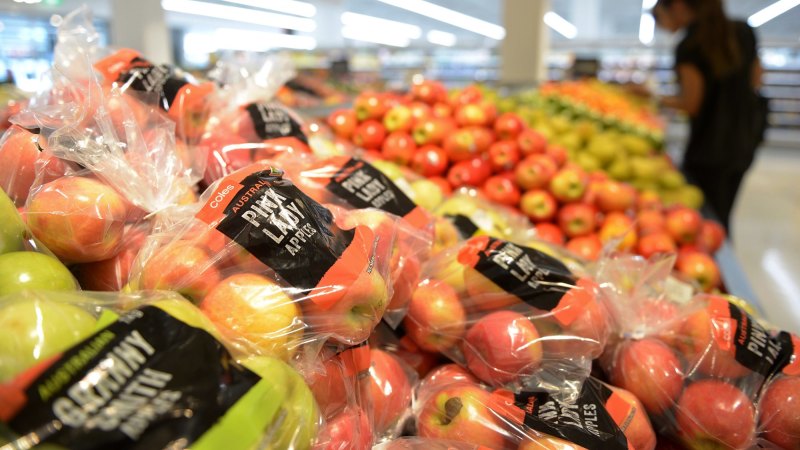
Making the Sustainable Move
With COVID-19 having a profound impact on how consumers think and behave, many have readjusted their consumption patterns and shopping habits. Specifically in the sustainability space, A survey by FMCG Gurus found that 55% of Australian consumers are more concerned about the environment than before the crisis.
Today’s consumers have good intentions but look to brands to help them to make positive changes towards protecting the environment in their day today. A 2018 study by HP Australia and Planet Ark has found that over 90% of Australian consumers are concerned about environmental sustainability but only half believe they are doing their fair share to protect the planet. The study surveyed over 1000 Australian Gen X (aged 38–53) and Gen Y (aged 22–37) consumers. 71% of respondents stated a willingness to pay a premium for environmentally sustainable products and were willing to back this up with their wallets
Thus, it is crucial that brands keep up to date with the latest trends in sustainable packaging.
In the past few years there has been a large scale outrage among consumers, in regards to the excessive use of plastic in fruit and produce packaging. Many took to social media to voice their opinions about the unnecessary amount of packaging used by well known supermarket chains.
In 2018, there was an Australian Senate Inquiry that pushed to phase out single use plastics nationwide by 2023, including plastic bags, takeaway containers, plastic lined coffee cups and chip packets as well as other single use food packaging. A second notable policy is the Australian National Waste Policy projected to 2030, which has set the target of diverting 80% of waste from landfill by 2030. In terms of national packaging targets, 70% of plastic packaging is set to be recycled or composted by 2025, and all packaging must have an average recycled content of 30% by 2025.
In line with the current and projected state of the sustainable grocery packaging industry, we’ve put together key insights around current innovations in the market, as below:
Why pick Woolies?
The Federal Government’s Recycling and Waste Reduction Bill 2020 announced earlier this year stated that they will increase onshore recycling, increase the availability of recycled packaging and create local jobs. A good example of a grocery giant that has taken substantial steps towards sustainable packaging is Woolworths.
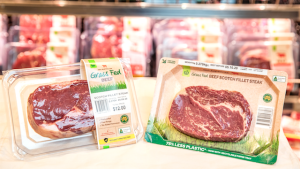
The red meat trays by Woolworths’ Own Brand pictured above are made up of a fresh seal film and recyclable paper tray that uses 75% less than the previous packaging. This is said to eliminate 114 tonnes of plastic from the supply chain each year!
In the fresh fruit and produce sections, Woolies has moved out of plastic clamshells and into adhesive tape for their banana packaging, replaced plastic trays with pulp fibre for their tomato trays and also plans to reduce the plastic film used on carrots and potatoes by 30% in weight.
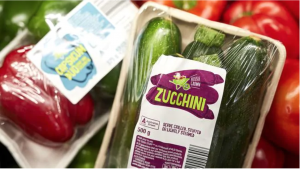
II. Aldi – Good Different
Aldi has been a leader in sustainability efforts as a supermarket brand. For instance, we have seen initiative in the fact that they never offered single-use shopping bags. When it comes to renewable sources of energy, Aldi has committed to be 100% powered by renewable electricity by the end of 2021. Also, in terms of their packaging, they have introduced 100% recycled and recyclable packaging to the Green Action Laundry Liquid and Wool Wash, as well as shown promise by removing over 11 million single-use plastic forks from the noodle bowls and cups.
According to Aldi’s Plastics and Packaging Progress Report 2019/20, the new zucchini packaging has 87% less plastic used compared to the standard PET punnet and wrap. With over 5 million zucchini packs sold as of October 2020 with this compostable tray they have avoided over 76 tonnes of plastic from going to landfill.
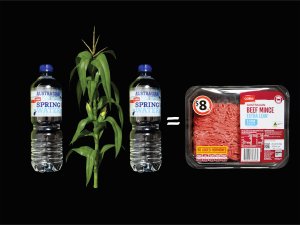
III. Good things are happening at Coles
According to the Coles Group Sustainability Report 2020, in FY20, more than 360 million pieces or 1.5 million kilograms of flexible plastic was collected from their stores by REDcycle, which is a program started in 2011. By reducing packaging and committing to make it easier for customers to recycle, Coles has improved their recyclability of Own Brand packaging. Coles also received the Australian Packaging Covenant Organisation’s Large Retailer Sector award for achievements in sustainable packaging design, recycling initiatives and product stewardship.
As well as increasing the amount of recyclable packaging, Coles have incorporated recycled content in products such as the spring water bottles that are made with 100% recycled plastic since 2014, and the fresh produce bags are made with at least 30% recycled content. Another key highlight is the eco-friendly bio-plastic recyclable packaging for its Coles Brand fresh meat and poultry products. This was done by purchasing an expected 121 million of recyclable meat and poultry trays, through which Coles hopes to reduce the amount of plastic waste by what would equate to 150 million recycled water bottles.
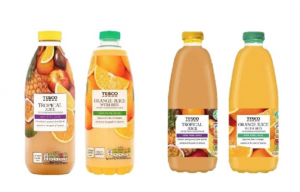
IV. Global Players – Tesco
Globally, we have seen that the drive towards sustainability is as strong as ever. The UK supermarket player Tesco has claimed they are “committed to removing unnecessary and non-recyclable plastic from our business”. For example, the amount of plastic used to pack chilled fruit juices since the start of 2020 aims to save 410 tonnes annually. They also plan to save 239 tonnes by replacing the full shrink sleeve with smaller labels on bottle, which comes with a fresh structural design to the bottle, saving a further 171 tonnes.
Tesco has also recently removed 4,500 tonnes of hard-to-recycle black plastic, with around 2,500 tonnes of black plastic trays that were previously used to pack ready meals, have been replaced with recyclable coloured plastic trays, that are made from 80% recycled plastic.
OUR SOLUTION: ENVIROCUBE™
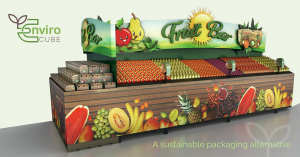
To combat the unnecessary use of plastic, particularly in the fruit and produce space, we have developed the Envirocube™ which is a sustainable solution for fresh produce packaging created out of at least 60% recycled fibre and is 100% recyclable. It can be recycled through the papermaking process an infinite amount of times as there are no polymer additives or resins that don’t break down.
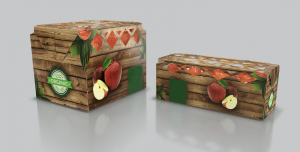
Designed for pre-packaged fruit in a small convenient offering which consumers can recycle at home through their kerbside collection. The Envirocube™ creates a unique branded offering in a plastic saturated market.
COVID 19 has forced the community into an unprecedented health predicament, whereby there is a large Grocery market opportunity to focus on Health. Apart from this, we know that by 2022 a Plastic Packaging tax will be introduced in Australia which will be applicable to all retailers, banning single use plastics, virgin resin or unused / unprocessed plastic. In addition any packaging containing less than 30% recyclable material will be subject to the tax.
Thus, we want to help retailers optimise resource recovery of consumer packaging by being a market leader through efficient supply chain management and also preventing the impacts of fugitive packaging on the environment.
To find out more about Envirocube™ and our commitments toward sustainability at UPD, chat to our friendly team of experts at: [email protected]

